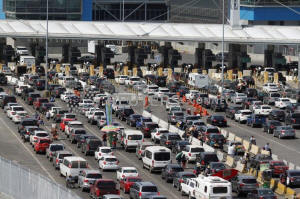|
Frequent crossers of U.S.-Mexico border
fret over threatened shutdown
 Send a link to a friend
Send a link to a friend
 [April 01, 2019]
By Julio-Cesar Chavez [April 01, 2019]
By Julio-Cesar Chavez
EL PASO, Texas (Reuters) - Workers and
students who frequently cross the U.S. border with Mexico worried over
the weekend about the impact on their lives if President Donald Trump
follows through on a threat to shut entry points used by hundreds of
thousands of people every day.
Faced with a surge of asylum seekers from Central American countries who
travel through Mexico, Trump said on Friday there was a "good
likelihood" he would close the border this coming week if Mexico does
not stop unauthorized immigrants from reaching the United States.
Shutting the southern frontier completely would disrupt billions of
dollars in trade and millions of legal border crossings, including those
made by U.S. citizen Andrea Torres.
The 22-year-old student spends weekdays with her aunt in El Paso, where
she attends the local campus of the University of Texas, and weekends
with her mother in Ciudad Juarez, Mexico.

On the border bridge linking the two cities, so many students cross
every day that authorities have assigned them their own pedestrian lane.
"Right now, it's better for me to stay in El Paso because I need to
finish school," Torres, who is studying art history, said on Friday as
she headed to Juarez for the weekend.
That would mean missing her mom. "It would be really hard," Torres said.
"I'm really close to her."
Gerardo Pozas, a 38-year-old mechanic, moved to El Paso from Juarez in
1997 to attend high school and later became a U.S. citizen. He has
always retained strong ties with his birthplace. He worried what he
would do if Trump closed the border.
"My family, my church and my girlfriend are (in Juarez). I wouldn't be
able to go," Pozas said. "But if I stay there, in Ciudad Juarez, I
wouldn't be able to come to my house."
LONG LINES AT BORDER
Department of Homeland Security officials had already warned traffic
with Mexico could slow as the agency shifts personnel from ports of
entry to help process asylum seekers.
Delays were already being felt on Friday, with waiting times longer than
usual on the Mexican side of the crossing between Juarez and El Paso,
and hours-long lines for trucks carrying goods from Mexican factories
into the United States.
[to top of second column]
|

Cars queue up in multiple lines as they wait to be inspected by U.S.
border patrol officers to enter from Mexico into the U.S., at the
San Ysidro point of entry, in Tijuana, Mexico March 29, 2019.
REUTERS/Jorge Duenes

Trade between the United States and its third-largest trading
partner totaled $612 billion last year, according to the U.S. Census
Bureau.
Brandon Carlan, a 21-year-old waiter from Boston, Massachusetts,
works in San Diego but lives in Tijuana, Mexico, because he cannot
afford San Diego's high rents. He said he crosses the border every
day.
"(Closing it) would affect me economically because I wouldn't be
able to pay for my bills," Carlan said. "There are people going back
and forth every day and they are not going to be able to see their
families or go to their houses."
Construction worker Alejandro Villegas, 43, is from Tijuana, Mexico,
but lives in San Diego. He said many of his colleagues live in
Mexico and cross the border daily.
"People have kids who study on this side and on the Mexican side and
they have to cross to take them to school, to go shopping and to
work so this is a big problem for us," he said.
Trump, who launched his presidential campaign in 2015 with a promise
to crack down on illegal immigration, has repeatedly threatened to
close the border during his two years in office but has not followed
through.
Mexico has played down the possibility of a border shutdown. On
Friday its foreign minister, Marcelo Ebrard, said the country does
not act on the basis of threats.
(Additional reporting by Jose Luis Gonzalez in Ciudad Juarez, Julia
Love in Mexico City, and Omar Younis in San Diego; Writing by Alex
Dobuzinskis; Editing by Daniel Wallis, James Dalgleish and Richard
Chang)
[© 2019 Thomson Reuters. All rights
reserved.]
Copyright 2019 Reuters. All rights reserved. This material may not be published,
broadcast, rewritten or redistributed.
Thompson Reuters is solely responsible for this content.
 |